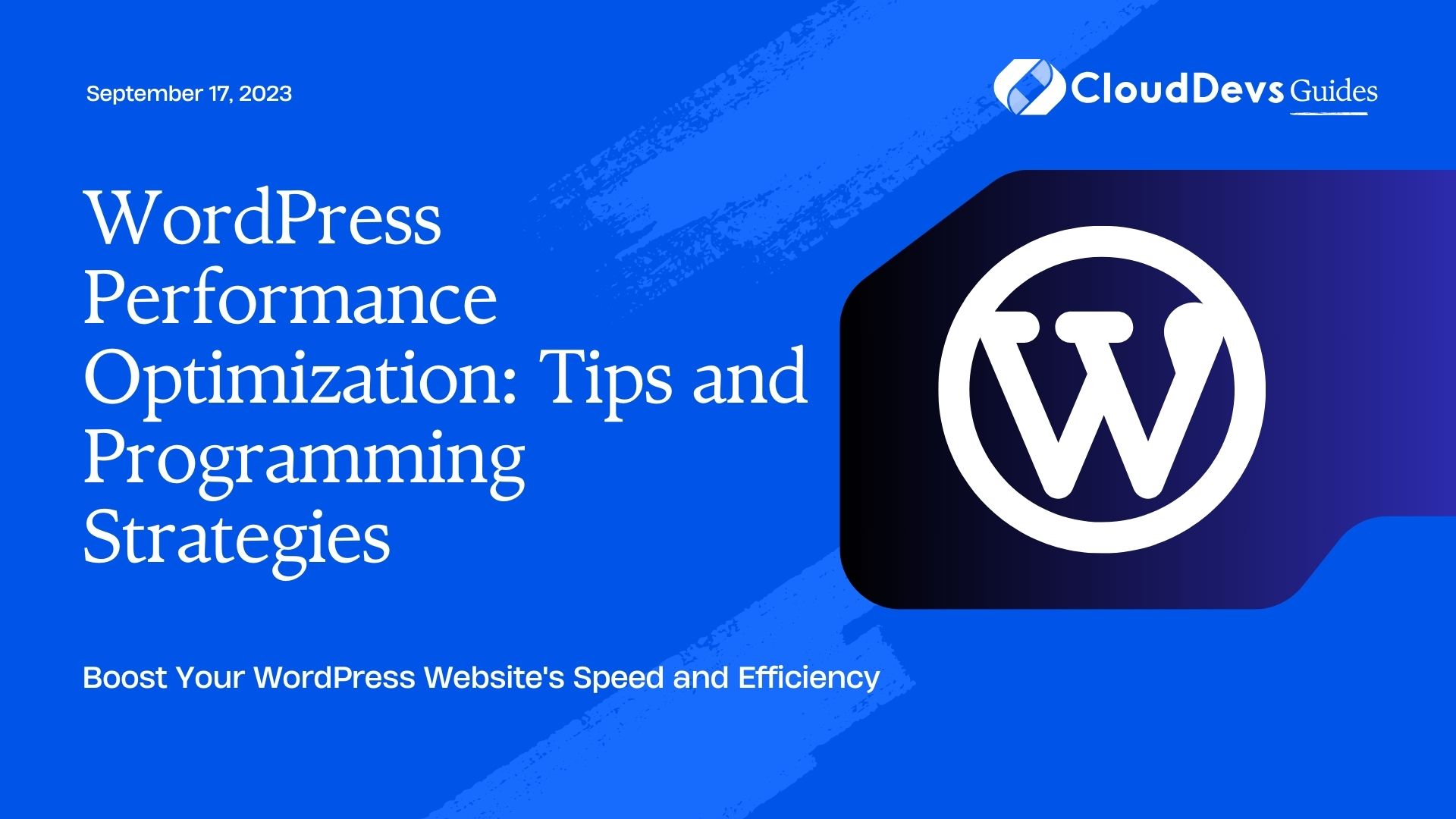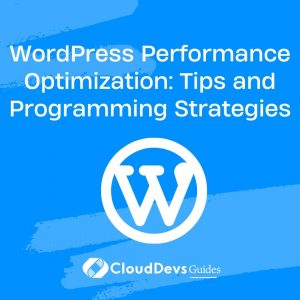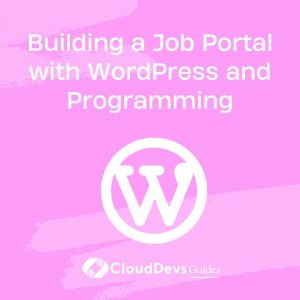WordPress Performance Optimization: Tips and Programming Strategies
In today’s fast-paced digital world, website performance is a critical factor for success. Users expect websites to load quickly and provide a seamless browsing experience. However, when it comes to WordPress websites, performance optimization can be a daunting task, especially for those without extensive programming knowledge. Fortunately, there are several effective tips and programming strategies that can significantly enhance the speed and efficiency of your WordPress site. In this blog, we will explore various techniques, from basic optimization tweaks to advanced coding practices, that will help you achieve a blazing-fast WordPress website.
1. Understanding the Importance of WordPress Performance Optimization
Before delving into optimization techniques, it’s essential to grasp why performance optimization matters. A fast-loading website improves user experience, reduces bounce rates, boosts conversions, and positively impacts search engine rankings. It is a crucial factor in ensuring that visitors stay engaged and keep coming back for more.
2. Measure and Analyze Website Performance
The first step in optimizing your WordPress site is to assess its current performance. Use tools like Google PageSpeed Insights, GTmetrix, or Pingdom to analyze your website’s speed and identify potential bottlenecks. These tools offer valuable insights into various performance metrics, such as page load times, server response times, and resource usage.
3. Choose a High-Quality Hosting Provider
Selecting the right hosting provider is paramount for WordPress performance optimization. Shared hosting may be cost-effective, but it can slow down your website due to limited server resources shared among many websites. Instead, consider managed WordPress hosting or VPS (Virtual Private Server) hosting, which provide dedicated resources, ensuring better performance and reliability.
4. Optimize Images for Web
Images are often the heaviest elements on a website and can significantly impact its loading speed. To optimize images for the web:
- Compress Images: Use tools like TinyPNG or ImageOptim to reduce image file sizes without compromising quality.
- Use Next-Gen Formats: Embrace modern image formats like WebP, which provide better compression and quality.
- Lazy Load Images: Implement lazy loading to load images only when they come into the user’s viewport, reducing initial page load times.
5. Minimize HTTP Requests
Each HTTP request made by a web page adds to its loading time. By reducing the number of requests, you can speed up your WordPress site. Here’s how:
Combine Files: Minimize CSS and JS files by combining them into single files, reducing the number of requests.
html <!-- Separate CSS --> <link rel="stylesheet" href="styles/style1.css"> <link rel="stylesheet" href="styles/style2.css"> <!-- Combined CSS --> <link rel="stylesheet" href="styles/combined-styles.css"> <!-- Separate JS --> <script src="scripts/script1.js"></script> <script src="scripts/script2.js"></script> <!-- Combined JS --> <script src="scripts/combined-scripts.js"></script>
Use CSS Sprites: Combine small images/icons into a single sprite sheet to minimize image requests.
css
/* CSS Sprite Example */
.icon {
background-image: url("spritesheet.png");
background-position: -10px -20px; /* Position of the desired image in the sprite */
width: 30px;
height: 30px;
}
6. Leverage Browser Caching
Browser caching enables browsers to store static resources locally, reducing the need to download them on subsequent visits. Implementing browser caching can significantly improve load times for returning visitors.
htaccess # Enable browser caching <IfModule mod_expires.c> ExpiresActive On ExpiresByType image/jpg "access plus 1 year" ExpiresByType image/jpeg "access plus 1 year" ExpiresByType image/gif "access plus 1 year" ExpiresByType image/png "access plus 1 year" ExpiresByType text/css "access plus 1 year" ExpiresByType text/javascript "access plus 1 year" </IfModule>
7. Optimize WordPress Database
The WordPress database can become bloated over time, affecting website performance. Regularly optimize the database by removing unused data, spam comments, and post revisions.
sql -- Delete post revisions DELETE FROM wp_posts WHERE post_type = 'revision'; -- Remove spam comments DELETE FROM wp_comments WHERE comment_approved = 'spam';
8. Enable GZIP Compression
GZIP compression reduces the size of your website’s files during transfer, significantly reducing loading times for users.
htaccess # Enable GZIP compression <IfModule mod_deflate.c> AddOutputFilterByType DEFLATE text/plain AddOutputFilterByType DEFLATE text/html AddOutputFilterByType DEFLATE text/css AddOutputFilterByType DEFLATE text/javascript AddOutputFilterByType DEFLATE application/json AddOutputFilterByType DEFLATE application/javascript AddOutputFilterByType DEFLATE application/x-javascript AddOutputFilterByType DEFLATE application/xml AddOutputFilterByType DEFLATE application/xhtml+xml AddOutputFilterByType DEFLATE application/rss+xml AddOutputFilterByType DEFLATE application/atom+xml AddOutputFilterByType DEFLATE application/rdf+xml AddOutputFilterByType DEFLATE application/xml AddOutputFilterByType DEFLATE image/svg+xml </IfModule>
9. Implement Content Delivery Network (CDN)
A Content Delivery Network distributes your website’s static resources across multiple servers worldwide, reducing latency and ensuring faster content delivery to users based on their geographic locations.
10. Use Caching Plugins
WordPress caching plugins like W3 Total Cache, WP Super Cache, or WP Rocket can automate many performance optimization tasks and enhance your website’s speed.
Conclusion
Optimizing the performance of your WordPress website is an ongoing process that requires continuous monitoring and improvements. By following the tips and programming strategies mentioned in this blog, you can significantly boost your site’s speed and efficiency, providing users with a seamless and delightful browsing experience. Remember that every millisecond counts, and even the smallest optimization can make a big difference in your website’s success.
Take the time to measure your site’s performance regularly, experiment with different optimization techniques, and stay up-to-date with the latest developments in WordPress performance optimization. With dedication and consistent effort, you’ll have a lightning-fast WordPress website that impresses visitors and ranks higher in search engines. Happy optimizing!
Table of Contents








